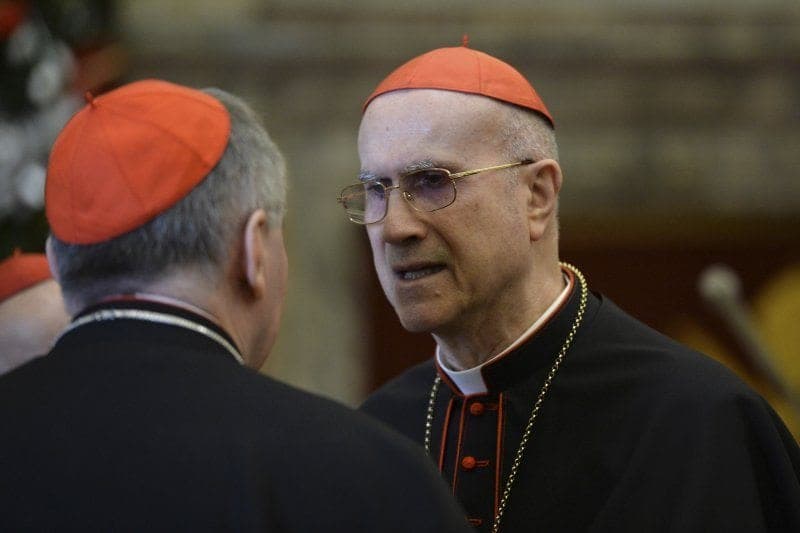ROME – Since we’re now once again in waiting mode for the Vatican’s latest criminal trial to resume, after a much-anticipated opening hearing on Thursday ended with a fairly quick decision to suspend things until Sept. 19 while new evidence is absorbed, it may be worth asking who has the most on the line in terms of the outcome.
Technically speaking, there are just two actual defendants: Giuseppe Profiti, a well-known Italian businessman and longtime Vatican confidante, and another Italian layman, Massimo Spina. Both are former officials of a foundation overseeing the papally-sponsored Bambino Gesù pediatric hospital in Rome, and both are charged with illicitly using a half-million dollars of the foundation’s money to renovate the private apartment of a prominent Vatican cardinal.
Both, theoretically at least, face three to five years in prison if convicted, not to mention fines starting at 5,000 Euro each – though were that to happen, it’s possible both could invoke their status as citizens of Italy rather than the Vatican to try to evade incarceration.
From the point of view of public opinion, however – at least in Rome, where such matters are always high drama – there may be two other actors with at least as much at risk: Italian Cardinal Tarcisio Bertone, the former Secretary of State under Pope emeritus Benedict XVI, and the much-vaunted financial reform project launched by Pope Francis shortly after his election.
Since the indictment of Profiti and Spina was announced in July, relating largely to events that transpired in 2013, many observers have found Bertone’s insistence that he knew nothing of any alleged wrong-doing a bit tough to swallow, given that:
- He personally appointed Profiti as president of the Bambino Gesù foundation in 2008.
- He’s longtime friends of both Profiti and Gianantonio Bandera, another Italian businessman whose now-bankrupt construction company got the contract for the work.
- Obviously, he still benefits from the results, since he’s still living in the apartment.
Many in Rome believe Bertone hasn’t been investigated or charged not for legal reasons, but political ones – he’s a cardinal and former Secretary of State, and, even in the Pope Francis era, that’s still considered a bridge too far.
In some ways, one wonders if Bertone, at least in terms of his reputation, might have been better off if prosecutors actually had indicted him. Then, his defense team could lay out the case for his innocence, perhaps proving to most people’s satisfaction that his hands are clean. As it stands, some may be tempted to conclude the trial is a cover-up, and therefore that Bertone probably must be guilty of something.
At this stage, it doesn’t seem Bertone will be called to testify by the Vatican’s three-judge panel, and thus won’t ever get even an indirect “day in court.”
As far as the overall financial reform project is concerned, many observers in Rome believe it’s already stalled. Key officials have exited the scene for a variety of reasons, and the power of the purse has been fairly thoroughly recentralized in the hands of the Secretariat of State, the Vatican’s traditional powerhouse.
If the perception in the wake of the trial is that the “old boy’s network,” at least for Princes of the Church, is still basically exempt from accountability, it might not inspire confidence about the reform’s future.
On the other hand, a veteran Italian Vatican-watcher on Thursday laid out the following case for me as to why this trial is actually a breakthrough, regardless of whatever its defects may be.
In the past, he said, the sort of informal arrangements some people suspect existed among Bertone, Profiti and Bandera have been commonplace, and they almost always involved an intersection between a senior churchman and a couple of wealthy Italian financial operators with strong Vatican ties.
If it takes two to tango, he argued, then it really doesn’t matter if the cardinal himself is indicted. If the same kinds of Italian laymen in and around the Vatican won’t be inclined to get involved in the future, out of fear that they’ll be the ones left holding the bag if anything goes wrong, then such deals can’t be made.
In other words, he suggested, those in the Vatican who believe in reform, but who are also realistic about how far they can push the cause in the here-and-now, may see this trial as a case of putting up with some short-term negative PR fallout for the sake of moving the ball in the real world.
Time, as always, will tell.
In the meantime, although Thursday’s court hearing didn’t provide any real drama in terms of substance, the visuals certainly were striking.
As another veteran Italian reporter put it, who’s covered any number of alleged Vatican financial scandals over the years, it was fairly stunning to see so many personalities he’s written about gathered in one place.
They included not only Profiti and Bandera, but also Italian layman Paolo Cipriani, former director of the Vatican Bank, and Paolo Mennini, also a layman and an official of the Administration of the Patrimony of the Apostolic See (APSA), who was placed under investigation by Italian authorities in February in a probe involving alleged market manipulation.
“I feel like I’m watching an episode of ‘Narcos’ on Netflix,” my reporter friend said, referring to a TV series about DEA investigations of Pablo Escobar and other notorious drug lords in Latin America in the 1980s and early 1990s.
While the relative amounts of both crime and money involved in all alleged Vatican shenanigans combined, measured against the cocaine trade at its peak, make such a comparison laughably apples-and-oranges, it nevertheless got his point across.















